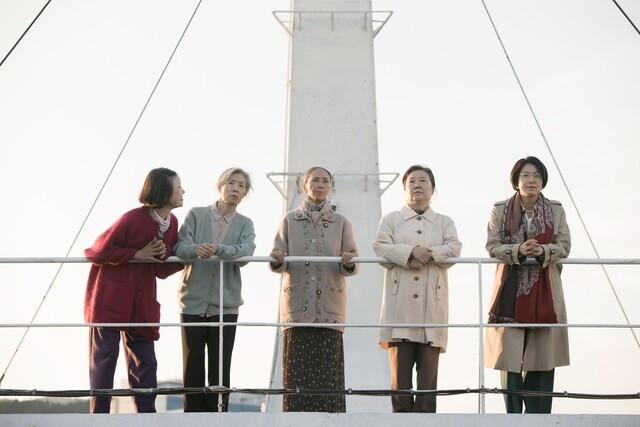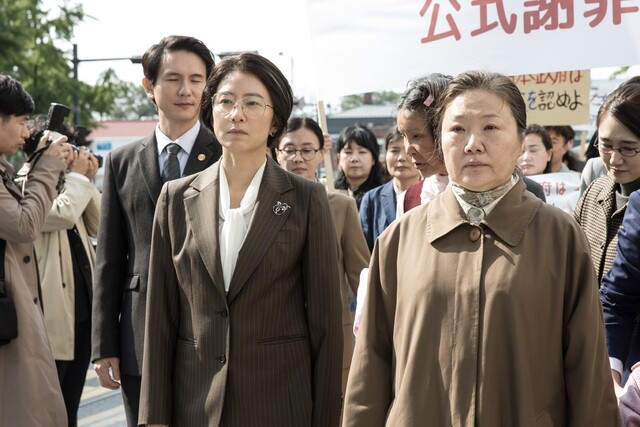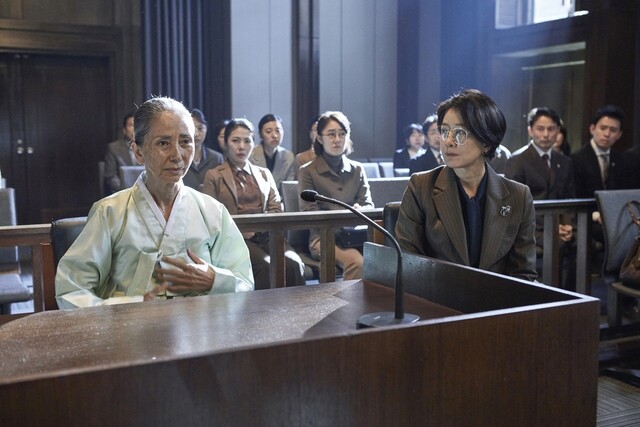hankyoreh
Links to other country sites 다른 나라 사이트 링크
“Herstory” opens new chapter in painful tale of comfort women victims

“The Murmuring” (1995), “The Murmuring 2” (1997), “The Murmuring 3” (1999), “My Heart Is Not Broken Yet” (2007), “The Big Picture” (2013), “The Last Comfort Women” (2014), “Tuning Fork” (2014), “Snowy Road” (2015), “Spirits’ Homecoming” (2016), “Spirits’ Homecoming, Unfinished Story” (2017), “I Can Speak” (2017). . .
Another film is being screened that carries on the unending effort to record and bear witness to the history of the former comfort women for the Japanese imperial army. “Herstory,” which is being released in theaters on June 27, tells the story of a little-known legal battle that the former comfort women fought in the Japanese courts. This film is a masterpiece that will leave an impact and warm the hearts of filmgoers this summer, thanks to its power as a true story and the acting chops of its accomplished actresses.
The film’s plot follows the basic historical facts. After Kim Hak-sun became the first former comfort woman to testify of her experience in the summer of 1991, historical facts that had hitherto been forgotten created a sensation in Korean society. Mun Jeong-suk (played by Kim Hee-ae), who is raising a daughter by herself while running a travel agency in Busan, South Korea, takes it upon herself to set up a phone line to take the names of former comfort women. During this process, Mun hears the story of Bae Jeong-gil (played by Kim Hae-sook), who had been working as Mun’s housekeeper while hiding the pain of her time as a comfort woman.

Enlisting the aid of Lee Sang-il (played by Kim Jun-han), a Korean-Japanese attorney, Mun recruits former comfort women to join a group of plaintiffs and files a lawsuit against Japan. This marks the beginning of 23 trials during the six years between 1992 and 1998, in which the 10 plaintiffs and 13 attorneys shuttle back and forth between Busan and the Japanese city of Shimonoseki.
The title “Herstory” positions the film as the antithesis of the male-centered historical perspective. As this suggests, the film depicts the challenging lives of the former comfort women from the female point of view. As we watch Moon continuing her struggle without compromising, despite trials and tribulations, and the former comfort women boldly standing up to Japan while declaring that “we are not alone but are on the national team,” it becomes clear that the comfort women issue is not just some aspect of our past but an ongoing issue that is written into Korean women’s DNA.
The cast’s outstanding acting contributes the most to the film’s power. Kim Hee-ae’s charisma is on display as she delivers lines in a flawless Busan accent, as well as Japanese. Taking the witness stand, Kim Hae-sook gives one of the best performances of her career as she ignites the pent-up pain and resentment. Speaking in a perfect Pyongyang accent, Ye Soo-jung (in the role of Park Sun-nyeo) uses rough language and behavior to hint at the pain she is hiding inside. Moon Sook (in the role of Seo Gwi-sun) puts on a stunning performance of a woman who overcomes her passivity and fear to act with courage at the critical moment. Lee Yong-nyeo (in the role of Lee Ok-ju) is a scene-stealer who makes us sympathize with people who are mentally troubled because of the pain of the past. All these women demonstrate what it means to be accomplished.
When Mun Jeong-suk is asked during the film why on earth she is so obsessed with the trial, she says, “It’s because I’m ashamed—ashamed of having enjoyed such a good life all by myself!” She also offers words of consolation: “Even if this trial does not change the world, it will change us.”

That line conveys how Min Kyu-dong ended up directing this film. “When I came upon Kim Hak-sun’s story, it felt as if a rock had lodged in my chest. I’ve been thinking about doing a film about the comfort women issue for the past ten years,” Min said. That will probably echo the somewhat unpleasant emotions that filmgoers will feel.
Some people may be annoyed to learn about the release of yet another film about the comfort women. But there is a number that demonstrates the need for Korean society to intensify its struggle to remember and record history: 28. That’s how many of the 268 former comfort women registered with the South Korean government are still alive today. Already this year, four of those women have passed away. There’s not much time left. That’s also why we need to encourage more people to make their way to the theater.
By Yoo Seon-hee, staff reporter
Please direct comments or questions to [english@hani.co.kr]

Editorial・opinion
![[Column] Has Korea, too, crossed the Rubicon on China? [Column] Has Korea, too, crossed the Rubicon on China?](https://flexible.img.hani.co.kr/flexible/normal/500/300/imgdb/original/2024/0419/9317135153409185.jpg) [Column] Has Korea, too, crossed the Rubicon on China?
[Column] Has Korea, too, crossed the Rubicon on China?![[Correspondent’s column] In Japan’s alliance with US, echoes of its past alliances with UK [Correspondent’s column] In Japan’s alliance with US, echoes of its past alliances with UK](https://flexible.img.hani.co.kr/flexible/normal/500/300/imgdb/original/2024/0419/2317135166563519.jpg) [Correspondent’s column] In Japan’s alliance with US, echoes of its past alliances with UK
[Correspondent’s column] In Japan’s alliance with US, echoes of its past alliances with UK- [Editorial] Does Yoon think the Korean public is wrong?
- [Editorial] As it bolsters its alliance with US, Japan must be accountable for past
- [Guest essay] Amending the Constitution is Yoon’s key to leaving office in public’s good graces
- [Editorial] 10 years on, lessons of Sewol tragedy must never be forgotten
- [Column] A death blow to Korea’s prosecutor politics
- [Correspondent’s column] The US and the end of Japanese pacifism
- [Guest essay] How Korea turned its trainee doctors into monsters
- [Guest essay] As someone who helped forge Seoul-Moscow ties, their status today troubles me
Most viewed articles
- 1[Column] The clock is ticking for Korea’s first lady
- 2After 2 months of delayed, denied medical care, Koreans worry worst may be yet to come
- 3Hong Se-hwa, voice for tolerance whose memoir of exile touched a chord, dies at 76
- 4Samsung barricades office as unionized workers strike for better conditions
- 5[Column] Has Korea, too, crossed the Rubicon on China?
- 6US overtakes China as Korea’s top export market, prompting trade sanction jitters
- 7[Editorial] As it bolsters its alliance with US, Japan must be accountable for past
- 8[Correspondent’s column] In Japan’s alliance with US, echoes of its past alliances with UK
- 9All eyes on Xiaomi after it pulls off EV that Apple couldn’t
- 10[Guest essay] How Korea turned its trainee doctors into monsters